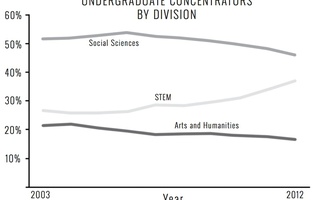
Professor of African American Music Ingrid T. Monson will serve as the interim dean of arts and humanities until the return of Diana Sorensen.
Diana Sorensen, divisional dean of the arts and humanities in the Faculty of Arts and Sciences, will resume her administrative duties in 2011 after a year-long sabbatical, marking a reversal in her initial decision to vacate the post.
Professor of African American Music Ingrid T. Monson will serve as interim dean before Sorensen returns in the fall of 2011 to assume the post for two more years, FAS Dean Michael D. Smith wrote in a letter to the Faculty.
In order to maintain the “momentum” created by Sorensen, whose tenure as dean has been marked by initiatives across the humanities, Smith said he asked her to “stay on” as dean.
“After consulting widely with the community, it became clear that Diana’s continued leadership was critical to the success of these innovative but fragile new changes,” Smith wrote.
Sorensen’s agreement to reassume the post comes as a surprise, given that she had announced earlier this year that she would return only to her teaching duties after her sabbatical.
Monson will be returning from a year-long sabbatical of her own to take up her role as interim dean of the division. She said she was contacted by Smith about the appointment a week ago, adding that she plans “to continue the direction Dean Sorensen has so effectively set forth.”
Since last fall, Monson has been at Stanford to work on a book about Neba Solo, a musician based in West Africa.
“He’s like a rock star in Mali,” said Monson, who has focused much of her work on jazz music.
Monson, who has been at Harvard since 2001 and served as the chair of the music department for three years, said that she may be able to incorporate the whimsical nature of jazz into her administrative role—“in the sense of life as one big improvisation.”
“She’s articulate, she’s thoughtful, and she’s accustomed to boundary crossing,” said Music Professor Kay K. Shelemay, who has worked with Monson for more than 25 years.
“It’s wonderful to hear that Dean Sorensen will come back after her leave,” Shelemay said. “And Ingrid Monson is really a terrific individual to hold down the fort.”
In the midst of FAS’ fiscal constraints, Sorensen pushed forward faculty searches and interdepartmental programs across the humanities, garnering the respect of her colleagues.
Sorensen, who has been at Harvard since 2001, is a scholar of Latin American literature and culture, and she plans to work on a book during her sabbatical. She could not be reached for comment.
—Staff writer Noah S. Rayman can be reached at nrayman@fas.harvard.edu.
Read more in News
Cartoonists Discuss Their Freedom to WorkRecommended Articles
-
Marsalis Brings Jazz and Metaphor to Sanders TheatreWhy jazz? Wynton Marsalis’ answer is simple: “Because it’s the national art.” For him, jazz is perfectly suited by its history and its structure to be morphed and meatphorized as an expression of the American identity.
-
Monson Explores the Intricacies of Coltrane“The relationship of the words to the music was a bit of a secret to be discovered,” said Monson. “Not even the musicians in the band knew that he was using a text, which suggests that he had it memorized.”
-
Upcoming Report to Address Challenges Facing the HumanitiesIn order to address concerns of declining student enrollment in the humanities, the Harvard Arts and Humanities Division is preparing to release an in-depth report analyzing trends in the humanities and recommending ways to rekindle undergraduate interest in the liberal arts.
-
 Revitalizing the Humanities at Harvard
Revitalizing the Humanities at Harvard -
Faculty Reports Call for Solutions to Predicaments Facing Humanities ScholarshipA set of three reports released Thursday by a faculty committee call for a vigorous response to the decline of humanistic study at Harvard, including the establishment of new curricular offerings, an internship program, a new undergraduate humanities center similar to the Harvard Innovation Lab, and a new humanities-minded organization roughly modelled after the Institute of Politics.
-
 Same Story, New Book: Repackaging Humanities at Harvard
Same Story, New Book: Repackaging Humanities at Harvard












